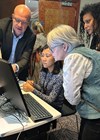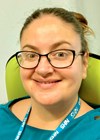In 1997, Paul Rosen, a relatively newly appointed consultant surgeon to the Oxford Eye Hospital, was approached by Richard Davies, a GP in Stanley, Falkland Islands, to assist in the provision and management of the Falkland Islands eye surgery service. Now nearly 30 years later, he and his team have made the 8000-mile journey to the South Atlantic multiple times and following the pandemic this has become an annual expedition.
It may appear to be a long way to go for five days clinical work but the impact on the Falkland Islands community should not be underestimated. For those in the team, the experience is a useful reminder of the fundamentals of daily clinical practice that are often overlooked; we take for granted the resources and technology available as a routine in our clinics at home.
The Falkland Islands are an archipelago in the South Atlantic made up of roughly 778 Islands. While inhabited by an English-speaking population, the community is made up of more than 80 different nationalities. They are a self-governing overseas territory with full internal self-government. The UK Monarch is the Head of State, who delegates authority to the governor. The chief executive is the head of the Falkland Islands Government. The majority of the population live in Stanley with the remainder living on the many small, isolated sheep-farming homesteads [1], known as ‘the camp’.

The eye clinic.

Main entrance to the King Edward VII Memorial Hospital, Stanely.

The team at Cape Pembroke.
Many people will have some knowledge of the Falkland Islands following the Argentine invasion and occupation on 2 April 1982. The sovereignty of the Falkland Islands has been an ongoing source of tension for nearly 200 years [2,3] between British and Argentine governments. Crowned a British colony since 1841 [4], the majority of the 3804 [5] inhabitants are descendants of British settlers, although other nationalities include immigrants from St Helena, France, Gibraltar, Scandinavia, and Chile. The campaign to defend and regain control the Falklands Islands in 1982 lasted 74 days and ended with Argentina surrendering on 14 June 1982. Many of the patients we met had vivid memories of the invasion in which three ‘Falklander’ islanders, 649 Argentine and 255 British military personnel were killed [6].
Healthcare in the Falklands is centred around the King Edward VII Memorial Hospital (KEMH) in Stanley, which is government funded, and like the NHS it is free at the point of delivery to island residents [7]. The military base at Mount Pleasant has its own healthcare provision apart from some primary care and all on-island secondary care. The KEMH is the only hospital in the Falkland Islands, with 24 beds including acute, maternity, isolation and intensive care. The facilities include outpatient clinics, dental surgeries, CT scanner and an operating theatre. The service is staffed by a chief medical officer, five GPs also undertaking extended practice, a chief nursing officer, a significant number of multi-skilled nurses covering primary, secondary community, and specialist areas, and a general surgeon, who comes with a wealth of experience and can do almost any surgical procedure, although not ophthalmology. There is a consultant anaesthetist who comes to the islands on a three-month rotation period. And there is also a range of services including nursing, allied health professionals, administration, facilities estates and engineering.



Service to the remote farm settlements is achieved by telephone consultation with a GP, and in an emergency situation, a team is either taken to the settlement or the patient is transferred by plane to the KEMH, using the Falkland Islands Government Air Service (FIGAS).
The KEMH hosts visiting specialist consultants, including obstetrics and gynaecology, psychiatry, orthopaedics, ENT, and oral and maxillo-facial surgery and of course, ophthalmology. For those patients who cannot wait for these visits, for either diagnostic or treatment purposes, they are referred to a UK hospital under a reciprocal agreement with the NHS, or to Santiago in Chile. Emergency treatments beyond KEMH capability are by air ambulance transfer to Chile or Uruguay.
The KEMH has basic but adequate Ophthalmic equipment. The original Zeiss® operating microscope donated by Nuffield Hospitals, and the Alcon® Infinity phaco machine was donated by Optegra Hospitals. They are now being replaced after 25 years’ service. In addition, there is a new A scan Biometer, optical coherence tomography (OCT), visual field analyser and two Haag Streit® slit-lamps.
The key preparatory work is all done back in the UK four to six months before visiting the Falkland Islands in order to allow for shipment (three months by sea) of all the theatre consumables, IOL bank and drugs. We work on the premise that the maximum number of cataract procedures safely achievable in five clinical days is 35. These are all completed within the first 2½ days to allow for time for review prior to the teams departure. Therefore, the preoperative assessment, diagnostics and biometry all happen in tandem with the operating list within the first two days. These are extended working days which require flexibility, and teamwork.
During the 2024 visit, the team were joined by Oculoplastic Consultant Surgeon Jonathan Norris, who was not only able to undertake specialist clinics and surgery but support the general clinic activity as well. In addition to the consultant ophthalmologists, the team consisted of Specialist Theatre Scrub Practitioner Hannah Owen-Smith, and Consultant Nurse Rebecca Turner for preoperative assessment and general clinic activity.
Productivity for 2024 during the five clinical days were:

The clinic build is coordinated prior to the visit with the dedicated administrator, along with the chief nursing officer. Referrals to the visiting optometrist are prioritised through a waiting list, which is reviewed at least twice before the teams departure from the UK and also ensures clear clinical management plans are in place. The optometrist is a virtual member of the team, not usually present in the Falkland Islands during the visit. However, they are essential for appropriate triage of referrals, post-op reviews and the medical management of patients with chronic long term conditions. The Optometrist has the support of the GPs at the KEMH, and in particular the Chief Medical Officer, Becky Edwards, who also provides intravitreal injections, for which Paul Rosen provided the teaching and encouragement to establish the service.
Clinically, some compromise is required as the facilities are limited. The key therefore is to be prepared for potential unexpected complications, such as dropped nucleus or endophthalmitis. An understanding of the limitations and willingness to be flexible is crucial to the success of the mission. Therefore, the standard care pathways are modified for extra safety. All postoperative patients are seen day one or two, and patient expectations have to be managed regarding the timing of their second eye surgery, with some having to wait a year with a risk of anisometropia. Only occasionally do we do simultaneous / sequential bilateral cataract surgery, although this is likely to increase in the future. We are also very aware that there is no immediate back-up, and the key is not leaving problems on our departure.

Clara, 101, who’ll have her second eye done in January 2025.
We have established a great relationship with the team in the KEMH and are in regular contact throughout the year. With ad hoc email advice and a telemed clinic using clinical examination and images we can provide opinion and recommendations for local treatment if possible throughout the year. And the Falklanders welcome the team with significant enthusiasm and a desire not to be forgotten, particularly 101 year old Clara, who has already messaged to say not to forget her second year surgery in January 2025!
References
1. Falkland Islands. Britannica. https://www.britannica.com/place/Falkland-Islands
2. Foreign Secretary Visits Falklands Islands. GOV.UK. https://www.gov.uk/government/news/foreign-secretary-visits-falklands-islands
3. Watt N. Falkland Islands Sovereignty Talks out of the Question, Says Gordon Brown (2009). The Guardian. https://www.theguardian.com/uk/2009/mar/28/falkland-islands-sovereignty-argentina
4. Falklands Referendum: Islanders Vote on British Status (2013). BBC News. https://www.bbc.co.uk/news/uk-21731760
5. Falkland Islands Population (2024). Worldometers. https://www.worldometers.info/world-population/falkland-islands-malvinas-population/
6. Gough BM. The British Reoccupation and Colonization of the Falkland Islands, or Malvinas, 1832–1843. Albion 1990;22(2): 261–87.
7. Health services. Falklands GOV.FK [via WayBack Machine]. https://web.archive.org/web/20141003220428/http://www.falklands.gov.fk/our-people/daily-life/health-services/
[All links last accessed August 2024]















